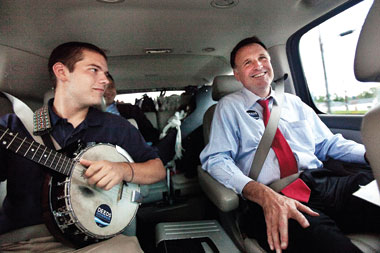Two months after the loss of his son and previous College of William and Mary student Austin “Gus” Deeds, Virginia Senator Creigh Deeds, D-Va., introduced new legislation to the Senate that addresses mental health services in the commonwealth.
The upper chamber unanimously approved the proposal Feb. 10. With the new mental health bill, authorities are able to detain a mentally ill individual for up to 24 hours in emergency custody until a psychiatric bed can be found, extending the previous limit by 18 hours.
In November, Deeds was stabbed multiple times by his son, Gus, who then shot himself. Gus had been released from emergency custody hours earlier after the local Community Services Board was unable to find an available psychiatric bed in the area within the allotted time period of six hours.
The College’s Government Department Chair John McGlennon pointed out that there is some controversy over the number of hours, with some law enforcement officials wanting a shorter period of time than Deeds’ proposed 24 hours.
“I think that the concerns of the law enforcement folks are basically that they don’t particularly want to be responsible for dealing with people who are being evaluated for mental health issues,” McGlennon said. “I think the broader issue is that Virginia has underserved those with mental health issues for too long.”
According to McGlennon, individuals needing psychiatric evaluations do not fall under the law enforcement’s jurisdiction, yet jails continually spend finances on those with untreated mental health issues.
Counseling Center Director Warrenetta Mann said in an email she was glad of the bill’s passing, particularly given Deeds’ personal connection with the issue.
“There are over 100,000 people in the Commonwealth of Virginia that benefit from public mental health services and they are all sons, daughters, brothers, sisters, mothers, fathers or other important people to someone,” Mann said.
From a professional standpoint, Mann was supportive of the bill’s goals.
“Those of us that make attempts to provide appropriate treatment and safety for people experiencing significant emotional crisis can certainly do better work when we don’t feel constrained by a ticking clock,” she said.
Mann explained that the College has a careful and thorough system developed with the local community mental health board, Colonial Behavioral Health. The program was also developed with the help of local hospital emergency rooms and the Williamsburg Pavilion, a local inpatient facility. The system allows for students in a mental health crisis to be evaluated professionally and given necessary medical attention and mental health treatment, while being kept in the least restrictive and most therapeutic environment available at that time.


































